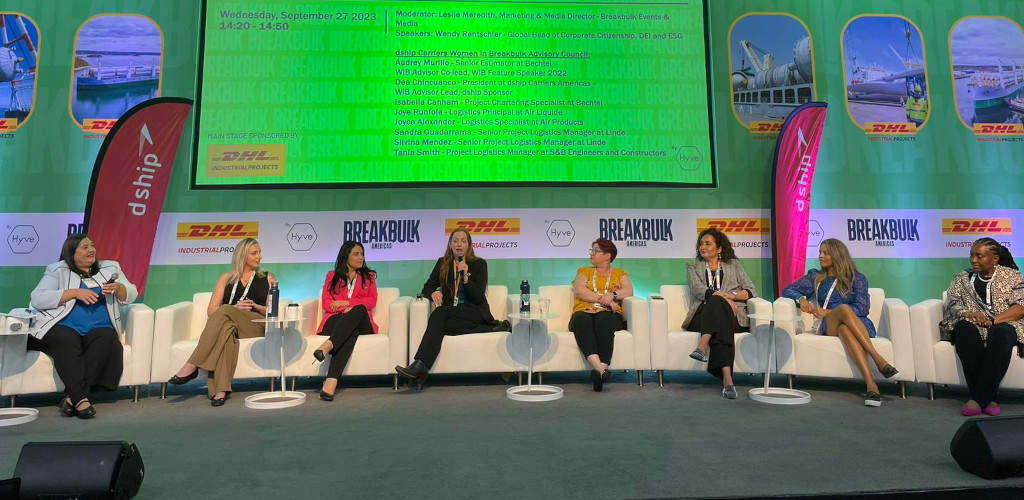Advisory Council Pose Questions to Expert Speaker in Main Stage Session
 By Alex Keimig
By Alex Keimig
Breakbulk Americas 2023: Continuing the conversation on unconscious bias in the workplace from Wednesday’s Women in Breakbulk Breakfast, session moderator Leslie Meredith welcomed eight members of the Women in Breakbulk Advisory Council to the main stage for a vital round of questions and answers with Wendy Rentschler, global head of corporate citizenship, DEI and ESG for BMC Software.
Fresh off an engagement with the United Nations, Rentschler fielded meaningful questions from the council as they sought to create an environment of discovery, education, and progress for those in attendance.
While the Women in Breakbulk Breakfast sponsored by dship Carriers caters specifically to women, all Breakbulk attendees were invited to catch the afternoon’s main stage session, regardless of gender.
Because diversifying our industries cannot take place within a vacuum, this mixed-gender audience exemplified the kind of cooperation needed to support the movement to dismantle unconscious biases in the workplace.
Some panelists kept their thoughts short, impactful, and to the point. “Always look a man at eye-level,” said Isabella Canham, project chartering specialist at Bechtel.
In any given moment, an individual may be bombarded with up to 11,000,000 individual points of stimulus from the environment around them. We can only consciously process 40 or so at a time, which means that what draws our attention most tends to capture our conscious focus.
These moments tend to overwhelm when our brains draw upon our unconscious biases: processing shortcuts to help reduce the clutter and filter out sensory noise from what else needs our brainpower. Unfortunately, this can lead to inefficient decision-making as well as a lack of growth and innovation.
“There are so many opportunities in shipping and logistics that allow us to bring a more diverse workforce to the table. For example, robotics and generative AI open the door to bringing so many more women and other diverse specialists into your staff while also significantly increasing your productivity,” said Rentschler.
“When you have more women in leadership roles, your other diversity metrics organically start to grow, your bottom line starts to grow, and your innovation starts to grow.”
The growth of productivity and bottom line begged a related question from Silvina Mendez, senior project logistics manager at Linde: if companies do better when women are allowed more seats at the table, then why does the gender-based pay gap persist?
A large component of the pay gap, according to Rentschler, is due not necessarily to women being offered lower salaries than men for the same work, but to women being significantly underrepresented in upper-level and C-suite roles, which drives down their relative average pay.
She offered one potential antidote to promote more diverse hiring: companies that utilize skills-based hiring, whereby applicants complete objective, skills-based assessments and are offered or denied an interview based on their performance score, often see the diversity of their subsequent hires increase even in the absence of any other changes.
By removing human subjectivity and bias from the first stage of the hiring equation, companies can reduce attrition, increase retention, foster diversity, hire across industries to find the most qualified potential candidate, and make data-backed hiring decisions that benefit the organization as a whole.
“Human capital is the largest investment in every industry. On average, you’re spending 70 percent of your money every year on people – that’s salary, benefits, training, and so on. If you start to think strategically about how you’re going to invest in those resources, you can see real growth,” she added.
“This is heading the right direction,” said Tania Smith, project logistics manager for S&B Engineers and Constructors. “This is relevant and important to all of us, but we cannot walk before we crawl.”
One panelist was asked what stood out to her most about the experience of the session. “I didn’t see my boss there in the audience to support me,’ she said. “He’s here today. But what difference is my participating in this effort making to the company if my boss doesn’t have twenty minutes to hear me talk about my experiences?”
“Be the change,” said Joye Runfola, logistics principle at Air Liquide. “You have to be the change.”
The advisory council of female leaders comprise:
Wendy Rentschler, global head of corporate citizenship, DEI and ESG, BMC Software
Audrey Murillo, senior estimator for Bechtel / Women in Breakbulk advisor co-lead
Dea Chincuanco, president of dship Carriers Americas / Women in Breakbulk advisor lead
Isabella Canham, project chartering specialist, Bechtel
Sandra Guadarrama, senior project logistics manager, Linde
Joyce Alexander, logistics specialist for Air Products
Joye Runfola, logistics principle, Air Liquide
Silvina Mendez, senior project logistics manager, Linde
Tania Smith, project logistics manager, S&B Engineers and Constructors
Watch our post-panel interview with Sandra Guadarrama:
